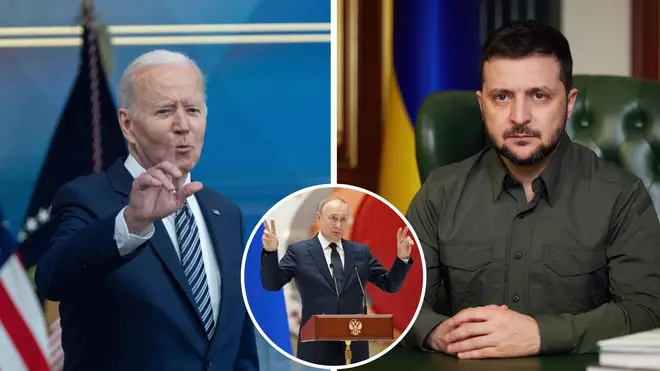
Oli Dugmore 4am - 7am
13 April 2022, 08:12 | Updated: 13 April 2022, 08:19

US President Joe Biden has for the first time accused "dictator" Vladimir Putin of genocide in Ukraine.
The US President's remarks have been hailed by Ukrainian President Volodymyr Zelenskyy as "true words of a true leader".
Mr Zelenskyy also mocked Putin's claims his war is going "to plan", asking how a plan that saw tens of thousands of troops being killed in a month could have been approved.
Russia has vowed to continue its bloody offensive in Ukraine seven weeks since the start of the invasion, and Putin has insisted the campaign is going as planned - despite a major withdrawal and losses thought to be close to 20,000 troops.
Russian troops are now focussing on the eastern region of Donbas, where Ukraine said it was investigating a claim that a poisonous substance had been dropped on its troops.
Read more: Pro-Putin ally Viktor Medvedchuk detained by secret service, Ukraine says
Read more: 'People expect better': Boris vows not to quit despite backlash over partygate fine

Joe Biden: Russia war amounts to ‘genocide’ and Putin trying to ‘wipe out’ Ukraine
Russia invaded on February 24 with the goal, according to Western officials, of taking Kyiv, toppling the government and installing a Moscow-friendly regime.
Mr Biden for the first time referred to Russia's invasion as a "genocide" and said "Putin is just trying to wipe out the idea of even being a Ukrainian."
Zelenskyy said: "In Russia it was once again said that their so-called 'special operation' is supposedly going according to plan. But, to be honest, no one in the world understands how such a plan could even come about.
"How could a plan that provides for the death of tens of thousands of their own soldiers in a little more than a month of war come about? Who could approve such a plan?" he asked.
But Putin said Moscow "had no other choice" and that the invasion aimed to protect people in parts of eastern Ukraine and to "ensure Russia's own security".
He vowed it would "continue until its full completion and the fulfilment of the tasks that have been set".
Putin's forces are gearing up for a major offensive in the Donbas, where Russian-allied separatists and Ukrainian forces have been fighting since 2014, and where Russia has recognised the separatists' claims of independence.
Military strategists say Moscow believes local support, logistics and the terrain in the region favour its larger, better-armed military, potentially allowing Russia to finally turn the tide in its favour.
In Mariupol, a strategic port city in the Donbas, a Ukrainian regiment defending a steel mill alleged that a drone dropped a poisonous substance on the city.
The assertion by the Azov Regiment, a far-right group now part of the Ukrainian military, could not be independently verified.
The regiment indicated there were no serious injuries.
Ukrainian President Volodymyr Zelensky said that while experts try to determine what the substance might be: "The world must react now."
The claims came after a Russia-allied separatist official appeared to urge the use of chemical weapons, telling Russian state TV on Monday that separatist forces should seize the plant by first blocking all the exits.
"And then we'll use chemical troops to smoke them out of there," the official, Eduard Basurin, said.
He denied that separatist forces had used chemical weapons in Mariupol.
Ukrainian deputy defence Minister Hanna Maliar said officials were investigating, and it was possible phosphorus munitions, which cause horrendous burns but are not classed as chemical weapons, had been used in Mariupol, which has been pummelled by weeks of Russian assaults.
Western leaders warned that if chemical weapons are found to have been used, it would amount to a grievous breach of international law.
Britain has warned that Russia may resort to phosphorus bombs, which are banned in civilian areas under international law, in Mariupol.
Most armies use phosphorus munitions to illuminate targets or to produce smoke screens.
Deliberately firing them into an enclosed space to expose people to fumes could breach the Chemical Weapons Convention, said Marc-Michael Blum, a former laboratory head at the Netherlands-based Organization for the Prohibition of Chemical Weapons.
"Once you start using the properties of white phosphorus, toxic properties, specifically and deliberately, then it becomes banned," he said.

'All options are on the table' if Russia uses chemical weapons